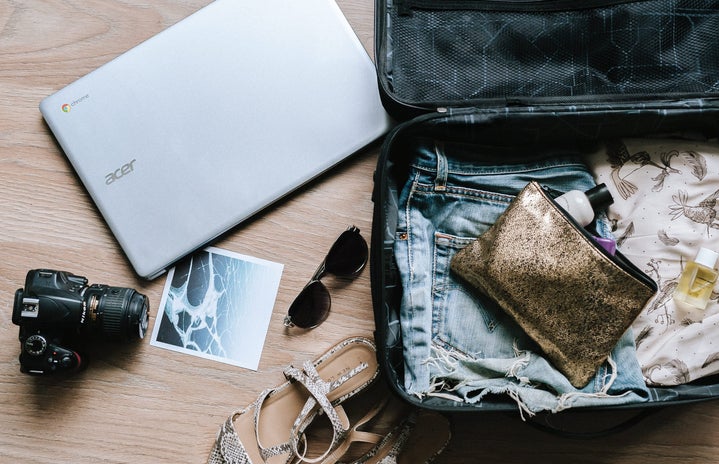Here you are, off on another adventure, this time interning abroad. Unlike your friends back home, you will be moving to another country, engaging with a different culture, and possibly interacting with a new language, all while juggling the requirements of your new job. This may feel a bit overwhelming, but don’t fear; we have some helpful tips that will get you settled, no matter where you are planning to intern abroad. So sit back, relax and let us help you make the most of your internship adventure.
1. Research the country you will be living and working in
The most important thing you can do to prepare for an internship abroad is research, research, research. Emma Jordan, a senior at the University of South Carolina, interned abroad at EMAA International in Prague, Czech Republic, and she emphasizes that finding out all the details will be huge for anticipating daily life at your internship. “My advice is to learn the culture as soon as possible,” says Emma. “The longer you wait to connect with where you are, the longer it will take for you to be comfortable where you are.”
And remember, learning about the culture means more than watching some YouTube videos about the best street food (though we suggest you do this as well). Check out some books from the library or see if there is anyone on-campus who has been or is from the location you are interning at. You can also reach out to your university’s study abroad office to see if they have any useful information, such as what outlet converters to bring. Even reading through the blog posts of someone living abroad in your intended country can be helpful.
“We always recommend reading some stories from interns who came before you; they offer valuable advice as well as help shape your goals,” says Sarah Bailey, the Market Mangager on the Academic Internship Council team at CIEE. “If you are interested in a CIEE Global Internship, we offer prospective students to be in touch with program Alumni and connect one on one. We feel there is no better advice than from someone who has completed the experience.”
It’s also worthwhile to research the career culture in the country you will be working in. Each country will have slightly different customs regarding professional behavior and rules, and these can really impact your day-to-day. In India, for instance, the work week lasts through Saturday and office hours usually begin around 10am. Such a big difference in working hours as compared to the U.S. can leave you feeling drained if you aren’t prepared for it. Differences are not always this apparent, however. “Another difference I noticed [other than language] was that people weren’t as concerned about working 40-hour weeks, but more focused on getting their job done,” explains Emma. “People spend less time at work and more time with their friends and families.” Spend some time Googling both you company and the country and city it is located in to prepare yourself for any differences.
2. Budget everything from groceries to transportation
It’s always smart to make a budget before traveling, and even more so when interning abroad. Unlike study abroad, you will likely have to find your own housing, which means rent and utility fees. Plus, you’ll want some extra cash to travel around and enjoy the city a bit.
Jazmine Lawrence, a senior at Virginia Commonwealth University, interned at a womenswear company based in Barcelona, Spain, and knows how important setting a pre-internship budget can be. “When it came to budgeting for my living expenses, I thought about how much I would spend per month. I had to account for groceries, phone bill, metro pass, miscellaneous purchases, and travel expenses (If I wanted to go out of town for the weekend),” says Jazmine. “It’s also important to account for the conversion rate because euros are worth a lot more than dollars.”
There are different ways to budget, and you don’t necessarily need a weekly or monthly budget either. A good tip would be to work with someone on-campus to help you get squared away, something Karime Diaz, a former CIEE intern, did before her internship in Barcelona, Spain. “I worked with my financial advisor to come up with a budget for food and personal expenses that would last until I came home,” says Karime. “It was different to budget for this because I didn’t have a steady income flowing in. I had to budget a fixed amount to utilize.”
Choose what method works best for you, and keep your money goals flexible while abroad. You’ll likely learn that you spend less than anticipated on some items, and more than you expected on others.
3. Pick up some of the local language
Even if you’ll be working in an English-speaking area, it’s still valuable to learn the basic language of the country you will be living in. This will help you connect with other people, as Emma discovered during her internship experience. “While in Prague, I took a Czech language class to learn the basics, which helped me a lot. It helped me get around the city easier, but I was also able to say hello, good bye, and ask my coworkers who didn’t speak English how they were,” she explains. “Some of them even helped me study for my Czech midterm and final and helped improve my pronunciation. It was a great way to practice what I was learning and connect with them.”
Beyond the cultural enrichment, learning the local langugage is practical for your daily routine. You’re going to be spending a few months in this location, so being able to order at restaurants, get directions or even figure out whether something is shampoo or conditioner is vital. Buy a small dictionary you can take around with you and try to use basic sentences to get around. You will find people are much more willing to help you out and you’ll get some practice in a wonderful skill.
Related: 5 Reasons to Intern Abroad This Summer (& How to Do It)
4. Do your best to make local friends
Becoming friends with your co-workers is helpful in terms of building a network, but we’d also suggest making local friends to take your time abroad to the next level. Besides finding someone to hang out with after work, having local friends will help you learn more about where you are living. Jordan experienced this firsthand during her internship abroad. “A lot of events happening in Prague weren’t publicized, so you learned about it if you were told by someone, or if you stumbled upon it while walking around,” says Emma. “The locals also know what the best things are to do in the city and where the best restaurants are.”
A great way to meet new people is to join a club related to something you are interested in. This could be anything from running through the cobbled streets of Paris to learning how to cook a perfect seafood paella – take advantage of what your city has to offer. Websites like Meetup.com, which offer already established groups you can join, are a great place to start. Another tip is to just be as open and outgoing as you can be. See someone at a café drawing, something you’re studying? Talk to them. Strike up a conversation over your shared interests and see where it leads. You may find a whole new world of possible friends.
If all of the above sounds a little too stressful, a good starting point may be to engage with other expats (people temporarily living abroad in the region). This is especially useful if you feel your language skills are lacking or want to speak to someone who understands where you are coming from. Most major cities have Facebook groups for expats, or you can search online and read the blogs of expats living in your city to see where they choose to hang out. While this is not the same as befriending the local people, it can be a good way to dip your toes into the social scene.
Related: The Ultimate Guide to Interning Abroad
5. Soak up all the new experiences you can
During an internship, it can be easy to fall into a routine of heading to work each day and then going back to your apartment to relax with some Netflix. But you’re living in a new country! It’s important to take advantage of your new location, making the most of your time abroad and this once-in-a-lifetime travel opportunity.
No matter what city you’re staying in, there should be plenty of local attractions that can teach you a little more about the culture and leave you with some lasting memories and Instagram-worthy moments. This can be anything from de-stressing in a local Finnish sauna or riding the cable car up the mountain in Austria. You can get plenty ideas of what to do from tourist books or local blogs, but remember to do your own exploration. “Visit the touristy sites, but also the lesser known sites to get a true feel for where you are,” says Jordan.
Don’t forget to also see other parts of the country, or even the surrounding region if possible. You will likely encounter a holiday or two that can give you the chance to travel further and see a little more. Sometimes these trips can really help you re-set after the work week, so take advantage of the cheaper travel to experience some new places. Make sure to take plenty of pictures or even keep a diary while traveling; these amazing memories can help you get through any tough times during your internship.
Interning abroad will make a big impact on your life, and it’s not something to be afraid of. If you follow these tips, you are sure to have a great experience. The most important thing, as Lawrence says, is to “take advantage of every opportunity that is given to you on your trip because it is limited and finite and there is always so much that is offered.” So, go on out there, and have an amazing time abroad!
Follow Xandie on Instagram


